Related Research Articles

Urology, also known as genitourinary surgery, is the branch of medicine that focuses on surgical and medical diseases of the male and female urinary-tract system and the male reproductive organs. Organs under the domain of urology include the kidneys, adrenal glands, ureters, urinary bladder, urethra, and the male reproductive organs.
In the medical profession, a general practitioner (GP) is a medical doctor who treats acute and chronic illnesses and provides preventive care and health education to patients of all ages.
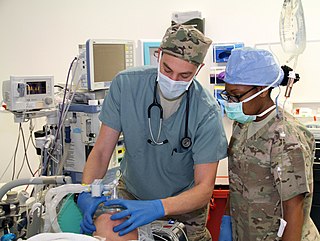
Anesthesiology, anaesthesiology, or anaesthesia is the medical specialty concerned with the total perioperative care of patients before, during and after surgery. It encompasses anesthesia, intensive care medicine, critical emergency medicine, and pain medicine. A physician specialized in anesthesiology is called an anesthesiologist or anaesthetist, depending on the country.

Doctor of Medicine is a medical degree, the meaning of which varies between different jurisdictions. In the United States, and some other countries, the M.D. denotes a professional graduate degree. This generally arose because many in 18th-century medical professions trained in Scotland, which used the M.D. degree nomenclature. In England, however, Bachelor of Medicine, Bachelor of Surgery was used and eventually in the 19th century became the standard in Scotland too. Thus, in the United Kingdom, Ireland and other countries, the M.D. is a research doctorate, higher doctorate, honorary doctorate or applied clinical degree restricted to those who already hold a professional degree (Bachelor's/Master's/Doctoral) in medicine; in those countries, the equivalent professional to the North American and some others use of M.D. is still typically titled Bachelor of Medicine, Bachelor of Surgery (M.B.B.S.).
A medical school is a tertiary educational institution, or part of such an institution, that teaches medicine, and awards a professional degree for physicians and surgeons. Such medical degrees include the Bachelor of Medicine, Bachelor of Surgery, Master of Medicine, Doctor of Medicine (M.D.), or Doctor of Osteopathic Medicine (D.O.). Many medical schools offer additional degrees, such as a Doctor of Philosophy (Ph.D.), master's degree (M.Sc.) or other post-secondary education.

Residency or postgraduate training is specifically a stage of graduate medical education. It refers to a qualified physician, dentist or podiatrist (DPM) who practices medicine, dentistry, or podiatry, respectively, usually in a hospital or clinic, under the direct or indirect supervision of a senior medical clinician registered in that specialty such as an attending physician or consultant. In many jurisdictions, successful completion of such training is a requirement in order to obtain an unrestricted license to practice medicine, and in particular a license to practice a chosen specialty. An individual engaged in such training may be referred to as a resident, registrar or trainee depending on the jurisdiction. Residency training may be followed by fellowship or sub-specialty training.
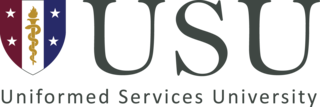
Uniformed Services University of the Health Sciences (USU) is a health science university of the U.S. federal government. The primary mission of the school is to prepare graduates for service to the U.S. at home and abroad in the medical corps as medical professionals, nurses, and physicians.

The Combat Medic/Healthcare Specialist is responsible for providing emergency medical treatment at a point of wounding in a combat or training environment, as well as primary care, and health protection and evacuation from a point of injury or illness. Additionally, medics may also be responsible for the creation, oversight, and execution of long-term patient care plans in consultation with or in the absence of a readily available physician or advanced practice provider. Combat medics may be utilized in hospitals and clinics where they have the opportunity to work in additional roles such as operating medical and laboratory equipment, performing and assisting with procedures, and beyond.

The Royal Canadian Medical Service is a personnel branch of the Canadian Armed Forces, consisting of all members of medical occupations. Nearly all members of the RCMS, along with the members of the Royal Canadian Dental Corps (RCDC), are employed in the Canadian Forces Health Services Group, an operational formation. The RCMS was formerly designated the Canadian Forces Medical Service until it was redesignated on October 9, 2013.
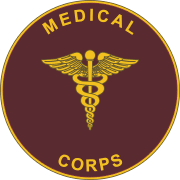
The Medical Corps (MC) of the U.S. Army is a staff corps of the U.S. Army Medical Department (AMEDD) consisting of commissioned medical officers – physicians with either an M.D. or a D.O. degree, at least one year of post-graduate clinical training, and a state medical license.
Medical education in the United States includes educational activities involved in the education and training of physicians in the United States, from entry-level training through to continuing education of qualified specialists.
A medical intern is a physician in training who has completed medical school and has a medical degree but does not yet have a license to practice medicine unsupervised. Medical education generally ends with a period of practical training similar to internship, but the way the overall program of academic and practical medical training is structured differs depending upon the country, as does the terminology used.

The Republic of China (Taiwan) has maintained a policy of conscription for all qualified males of military age since 1951. The Taiwanese government planned originally to end this policy in 2014, but abolishing conscription is quite controversial among Taiwanese society, and hence the government has not yet created a firm schedule for its abolition. Females from the outlying islands within the province of Fuchien, which are geographically closest to mainland China, were also required to serve in a civil defense role, although this requirement has been dropped since the lifting of martial law. Although the majority of all enlisted positions in the ROC Armed Forces have been and are currently filled by draftees, the government intends to gradually expand the number of volunteer soldiers with the eventual goal of forming an all volunteer military. However, even then there will be compulsory basic training for all males reaching 18. Recent years have also seen an increase in the service options open to draftees, including alternative service with the Ministry of the Interior (MOI), as well as specialized service options for draftees in specific professions. The draft process is set forth under the ROC Military Service Act under the auspices of the MOI's National Conscription Agency as well as by Article 20 of the ROC Constitution.
Medical school in the United States is a graduate program with the purpose of educating physicians in the field of medicine. Such schools provide a major part of the medical education in the United States. Most medical schools in the US confer upon graduates a Doctor of Medicine (MD) degree, while some confer a Doctor of Osteopathic Medicine (DO) degree. Some, unique to the United States, confer a Doctor of Podiatric Medicine (DPM) degree. Most schools follow a similar pattern of education, with two years of classroom and laboratory based education, followed by two years of clinical rotations in a teaching hospital where students see patients in a variety of specialties. After completion, graduates must complete a residency before becoming licensed to practice medicine.

Adam Mayfield Robinson Jr. is a United States Navy vice admiral who served as the 36th Surgeon General of the United States Navy (2007–2011).
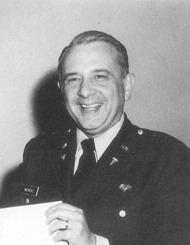
Major General Enrique Méndez Jr., was a United States Army officer who was also the first Puerto Rican to hold the positions of Army Deputy Surgeon General, Commander of the Walter Reed Army Medical Center and Assistant Secretary of Defense for Health Affairs. He was also the Dean and President of the Ponce School of Medicine in Puerto Rico. Also served as Secretary of Health of Puerto Rico.
Match Day is a term used widely in the graduate medical education community to represent the day when the National Resident Matching Program or NRMP releases results to applicants seeking residency and fellowship training positions in the United States. Match Day for the NRMP Main Residency Match is on the third Friday of March each year, and Match Day ceremonies occur at many of the 155 medical schools in the United States where those results are announced. Match Days for the NRMP Fellowship Matches occur throughout the year because each Fellowship Match has its own schedule of dates. Other national matching plans like the American Osteopathic Association (AOA), American Urological Association, and the San Francisco Match have dates on which they release their results. By participating in a national matching plan, applicants contractually agree to attend the residency, internship or fellowship programs to which they match. The same agreement applies to the programs; they are obligated to train the applicants who match to them. In 2017, Match Day hit a record-high as 35,969 U.S. and international medical school students and graduates vied for 31,757 residency positions.

The S. M. Kirov Military Medical Academy is the oldest higher education institution of military medicine in Saint Petersburg and the Russian Federation. Senior medical staff are trained for the Armed Forces and conduct research in military medical services.
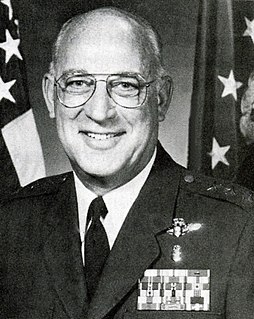
Monte Baldwin Miller was a lieutenant general in the United States Air Force who served as surgeon general of the United States Air Force from 1988 to 1991.
Azerbaijan has mandatory military service in the Azerbaijani Armed Forces for all able-bodied male civilians. Conscription is at the age of 18. According to Article 76.2 of the Constitution of Azerbaijan, if a citizen's conscience prevents them from serving, alternative service other than military service is not available. Women between the ages of 19 and 40 are also accepted into the armed forces on a voluntary basis. There are four call-up periods per year. The length of military service is 18 months, the compulsory service period is reduced from 18 to 12 months for university graduates.
References
- 1 2 Alfred E. Clark (October 16, 1976). "Frank B. Berry, Chief of Defense Doctors". The New York Times. Retrieved 7 March 2018.
- ↑ Berry FB (1976). "The story of "the Berry Plan"". Bull N Y Acad Med. 52 (3): 278–82. PMC 1808239 . PMID 766868.
- ↑ Elizabeth Becker (June 7, 1977). "Military Has Severe Doctor Shortage" . Retrieved 8 March 2018.